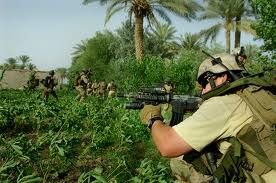U.S. Special Ops Leaving Iraq
Several nights a week, Iraqi and U.S. special forces operatives head out in Humvees or Black Hawk helicopters to arrest extremists in the most volatile region of Iraq.
After years of training with their U.S. counterparts, the black-clad Iraqi forces are taking the lead, busting in doors and arresting suspects while their American advisers monitor the mission.
The United States has its own counterterrorism force on the ground here, and its work has remained a priority even as the number of American combat troops declines, in preparation for their full withdrawal by the end of the year.
But the U.S. Special Operations trainers here say their work is almost done, as the about 4,100 members of Iraq’s Special Operation Forces — trained and equipped by the United States — gear up to be the main bulwark against insurgents.
Prime Minister Nouri al-Maliki’s direct command of the elite forces has prompted fears among some Iraqi political parties and factions that the units will turn into a private militia. Maliki has denied that he maintains a security force outside the regular chains of command, but the United States has pushed for the force to be placed under a conventional chain of command, overseen by the Defense Ministry.
In Mosul, one of the key areas for counterterrorism operations in Iraq, worries about prime ministerial meddling are distant. On a recent day, Col. Farhad Haji Omer, an Iraqi Kurd who leads the 7th Regional Commando Battalion, based at the U.S. military’s Camp Marez, was focusing on the mission later that night.
Farhad, dressed in the signature black army fatigues of his unit, used a PowerPoint presentation and a red laser pen to brief his 43 men and nine American trainers. He showed aerial pictures of a neighborhood in the city of Tal Afar where they planned to detain a man suspected of making car and road bombs. Weeks of intelligence operations had confirmed that the man, and possibly his two brothers, would be hiding in a safe house on the edge of town.
“In the beginning, we did the planning and the hits,” said a U.S. Special Forces captain. “Now we just give advice after the mission is over.” The Americans sometimes do more, providing intelligence assistance before and during missions and using their weapons, if needed, in self-defense.
The U.S. officer had spent four tours training Iraqi counterparts and, with his time in the country coming to an end, he said his mission was nearly done. “These guys can take care of business themselves,” said the captain, whose identity, like that of other U.S. Special Forces operatives, was withheld for security reasons. ...


